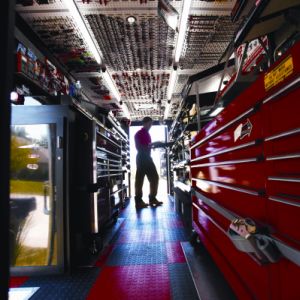
Snap On Tools Australia has been quietly going about its business of retailing tools for the auto and aviation industries for more than 20 years; now its success as the smallest yet most profitable subsidiary of the US based global company is coming to light.
Nick Hudson, national franchise manager, believes some of the success can be attributed to removing the barrier to finance with an in-house finance offer to help fund franchisees’ entry into the business, and the web-based discovery tool which helps prospective franchisees understand the business.
“The process can be as quick or as slow as people want. If we have territory and a truck available, it can be speedy,” says Hudson.
The most recent franchisee, who will be based in Auckland, had just left for two weeks of training at the US headquarters, and had taken only 35 days from initial enquiry to reach this point.
Although the franchise revolves around providing high quality tools and diagnostic equipment to mechanics, franchisees don’t need to join the business with technical know-how.
“The technical knowledge is learned in the field with the franchise development manager. Franchisees go to boot camp [at the US head office in Dallas] to understand sales, how to present the products, the software. There’s a focus on developing their business skills,” says Hudson.
This is followed by two days at the Sydney HQ when franchisees spend time in each department, gaining an understanding of how the whole business is run and the process of getting orders out to the trucks.
“Then we send them back to their territory, and the franchise development manager takes over, working with them day in, day out for two to three weeks, showing them how to put the theory into practice.”
ONGOING SUPPORT
Once a franchisee is up and running, the person they will have the longest relationship with is the sales development manager, someone who rides with them in the van, conducts business reviews and presents monthly sales meetings to a group of 10 to 12 franchisees.
The separation of support roles is much clearer now at Snap On, he says, and this is a deliberate strategy. For instance, diagnostic product specialists can be called in to meet clients, analyse problems and demonstrate high-tech equipment solutions.
“We’ve spent time on redefining roles, taking responsibility from sales development managers to allow them to develop sales for their franchisees. We were asking too much of too many people.”
So franchisees have on hand assistance with sales, with high level diagnostics, and with business development. One individual has been appointed asset manager to nurture those franchisees who need extra help with keeping their business on track.
“There’s just one, he’s highly skilled in business development and has been on the trucks. He can work with franchisees one-on-one,” says Hudson.
While some franchisees are quite happy to work for themselves, free of any staff, others do look to expand and take on bigger challenges. Snap On can provide help in business development and financing the growth.
Growth often comes from splitting territories, something that franchisees aren’t always keen to embrace. But experience shows that with good analysis of the opportunities in the territory, working in a smaller area increases efficiencies.
National franchise manager, Nick Hudson. Image: dailytelegraph.com.au
THE RIGHT FRANCHISEE
So who makes an ideal franchisee? “A people person, that’s one attribute you can’t teach,” says Hudson. “We’re about relationship building with our customers, going back to the same customers the same time each week. It also suits guys who like to play around with tools, but they don’t need an auto or mechanic background.
“We’ve taken away the financial hurdle and can really make sure we have the right people the business suits.”
Image: franchisebusiness.com.au

